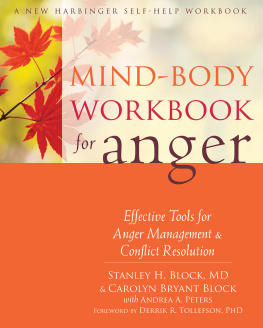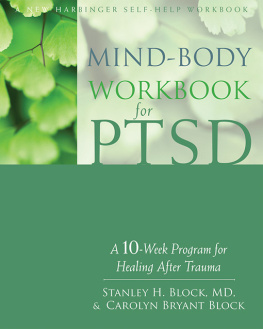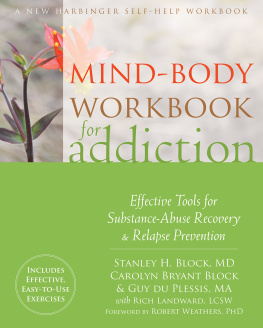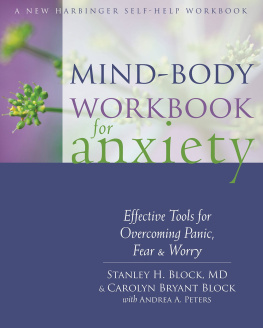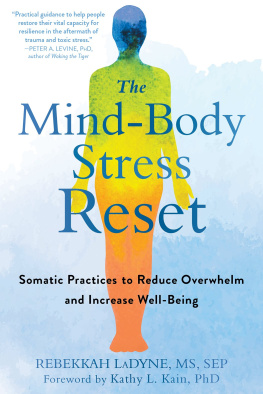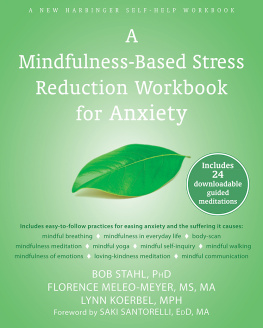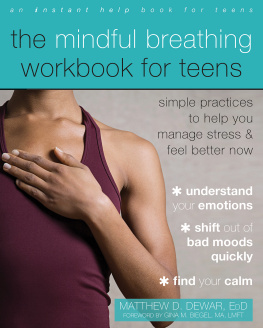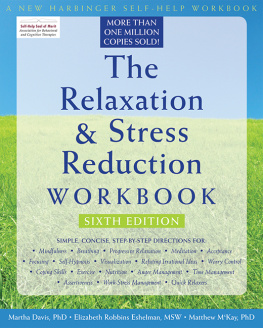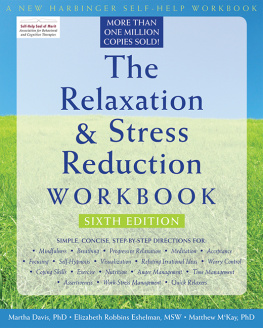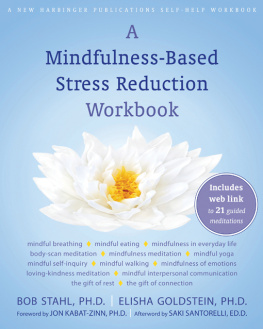Dr. Stanley H. Block helps people see their mind as never before by helping them recognize their identity system and then guiding them through simple mapping exercises to teach them how to bridge, which rests their I-System so that they can unblock their potential to deal with their career, health, or anything.
Shirley MacLaine, actress and author of Out on a Leash and The Camino
Transform your life in a matter of ten days. I did.
Christiane Northrup, MD, author of Womens Bodies, Womens Wisdom
Mind-body bridging is a new body-mind language that allows people to reconnect with their ability to function effectively. Since I have directly witnessed the power and efficacy of Stans work, I am very ready to state that the approach of mapping and bridging can be an adjunct to spiritual practice or it can stand on its own.
Charlotte Joko Beck, bestselling author of Everyday Zen
Dr. Blocks bridging methods have given me new ways to help pitchers deal with adversity and compete in the major leagues.
Rafael Chaves of the New York Yankee Organization, former pitching coach for Seattle Mariners
This mind-body medicine-based workbook guides readers back to their inner reservoir of self-empowerment by showing them how to override a learned stress response and faulty brain network and regain access to their natural executive functioning. The mind-body mapping exercises outlined within teach readers how to reduce stress and develop a set of personalized, powerful, crisis-management tools. Moreover, since these exercises are quick and easy to do, theyll become a welcome staple of your lifelong health regimen. But dont be fooled by their simplicity. Ive witnessed their powerful impact personally and in my work with cancer patients and their caregivers.
Michelle Rodoletz, PhD, assistant professor in the department of psychiatry, Fox Chase Cancer Center, Philadelphia, PA, and director of the Continuing Education Program for HealthForumOnline ( www.healthforumonline.com )

Publishers Note
The information contained in this workbook is intended to be educational. The authors and publisher are in no way liable for any use or misuse of the information. The ideas, techniques, and suggestions in this workbook are not intended as a substitute for expert medical, substance abuse, or mental health diagnosis, advice, or treatment. If you are under the care of health care professionals, please consult with them before altering your treatment plan. All names and identifying information of individuals in this workbook have been disguised to protect their anonymity.
Distributed in Canada by Raincoast Books
Copyright 2012 by Stanley H. Block & Carolyn Bryant Block
New Harbinger Publications, Inc.
5674 Shattuck Avenue
Oakland, CA 94609
www.newharbinger.com
All Rights Reserved
Acquired by Jess OBrien; Cover design by Amy Shoup; Edited by Rosalie Wieder
Library of Congress Cataloging-in-Publication Data
Block, Stanley H.
Mind-body workbook for stress : effective tools for lifelong stress reduction and crisis management / Stanley H. Block, Carolyn Bryant Block, and Andrea A. Peters.
p. cm.
Includes bibliographical references.
ISBN 978-1-60882-636-0 (pbk. : alk. paper) -- ISBN 978-1-60882-637-7 (pdf e-book) -- ISBN 978-1-60882-638-4 (epub) 1. Self-esteem. Stress tolerance (Psychology) 3. Stress (Psychology) I. Block, Carolyn Bryant. II. Peters, Andrea A. III. Title.
RC489.S43B56 2012
155.9042--dc23
2012027986
Contents
Acknowledgments
Our teaching about stress is primarily influenced by the effective way individuals suffering from stress have shared with us how they utilized Mind-Body Bridging to liberate themselves from the restrictions of the I-System. Although we have not specifically referenced other workers in the stress reduction field, we appreciate their pioneering work. The clinicians from around the world using, developing and refining Mind-Body Bridging have our gratitude and thanks. Deserving of specific mention are the members of the International Mind-Body Bridging Certification Committee: Don Glover, Rich Landward, Theresa McCormick, Andrea Phillips, Isaac Phillips, and Kevin Webb. The research efforts of Yoshi Nakamura, David Lipschitz, and Derrik Tollefson, to establish a firm evidence basis for Mind-Body Bridging is much appreciated. Carol Ann Kent, the MBB coordinator has ably assisted in the preparation of this workbook. The direction from the editors of New Harbinger Publishing was most helpful
Introduction
Stress impairs our sleep, damages our health, and prevents us from taking care of ourselves and our responsibilities. Stress drives us to overwork, overeat, drink too much, and take excessive amounts of tranquilizers, pain medications, and sedatives. Our relationships deteriorate, our bodies age prematurely, and we lose brain cells at an accelerated rate. Yes, its true: stress can shrink your brain. Researchers have found that healthy adults aged eighteen to forty-eight who are subject to significant stressors have decreased brain volume (Ansell et al. 2012).
STRESSORS, STRESS, AND STRESS SYMPTOMS
Physical, social, or psychological stressors are demands that overload us. Stress is the minds and bodys signal that a stressor has drained our physical and emotional resources. Stress may manifest itself as anxiety, fears, worry, depression, irritability, anger, lethargy, muscular tension, assorted aches and pains, overworking, hypertension, overeating, indigestion, diarrhea, constipation, insomnia, poor decision making, and alcohol or drug abuse. Stress negatively affects the quality of your life and prevents you from facing situations with a ready and relaxed mind and body.
CONVERTING STRESS INTO SELF-POWER
Self-power is your innate ability to deal effectively with the stressors in your life without stress overload. Converting stress into self-power isnt medieval alchemy; its twenty-first-century neuroscience. Our self-power is regulated by a brain network researchers refer to as the


